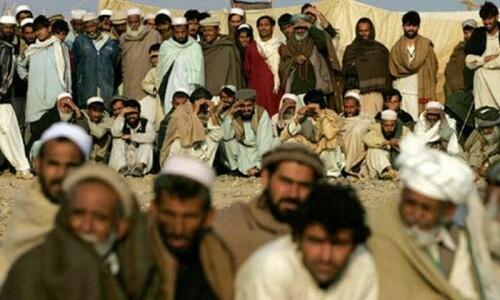SUKKUR / LAHORE: Pakistan has expressed disappointment at the Indian cricket team’s decision to don army caps during a match against Australia, and has urged the International Cricket Council (ICC) to ban the Indian team for politicising the game.
Speaking to reporters at Jatoi House in Sukkur on Saturday, Foreign Minister Shah Mehmood Qureshi said that International Cricket Council (ICC) should take a suo motu notice of the matter.
On Friday, the Indian cricket team had worn camouflage caps during its match against Australia “as [a] mark of tribute to the loss of lives in Pulwama terror attack and the armed forces”.
Talking about the prevailing India-Pakistan situation, the minister said Mr Modi was under tremendous pressure and that every opportunity to influence the [electoral] outcome was crucial for the Indian premier till the national polls.
Mr Qureshi, however, warned that Pakistan was prepared to give a befitting response in case of any aggression from India.
FM says opposition parties in India are not accepting Modi’s policies on Kashmir
He said that they had invited all national parties to discuss the National Action Plan and give their suggestions to improve it. Given the tense [regional] situation, all parties were on one page and that was also the need of the hour, said the minister.
Due to the government’s positive attitude and geopolitical strategy, the Indo-Pak situation was de-escalating, he said, adding that Pakistan’s message for peace was manifested when it returned the Indian air force pilot with respect and honour and the whole world was appreciating Pakistan for the gesture.
Mr Qureshi said that opposition parties in India were strongly criticising Mr Modi and not accepting his policies [on Kashmir]. In such a situation, the Indian prime minister would not sing songs of peace and winning the elections was a compulsion to him. He said that India was not very accommodating on the issue of Kashmir as they were yet to agree to make an inquiry commission to probe the dispute as mentioned in the UN report.
Talking about the provision of medical treatment to Nawaz Sharif, he said it was the responsibility of the government and Prime Minister Imran Khan had also issued directives for the provision of every possible medical facility to the ex-premier and wished for his complete recovery.
Meanwhile, Federal Information Minister Fawad Chaudhry also demanded that the ICC ban the Indian cricket team for wearing army caps during the match.
“The ICC should ban the Indian cricket team for its matches to tell that the team is not above international laws,” he said. He recalled that the council had suspended South African cricketer Mubeen for wearing a band with the word “Gaza” inscribed to highlight the plight of people in Palestine.
The information minister was speaking to reporters after visiting a social welfare complex at Township in Lahore on Saturday. He urged Pakistan Cricket Board (PCB) chairman Ihsan Mani to take up the issue with the ICC.
“Don’t you think the Pakistani cricket team will like to highlight the Indian government atrocities being committed against Kashmiris in India-held Kashmir,” he asked.
“If the countries will use sports grounds for political point scoring then the game will be ruined,” he said, adding that Pakistan wanted to keep sports separate from politics.
Pointing out that the Wrestling Federation had banned India and the Olympics Association had raised objections as well, the information minister said “India has become isolated with its uncalled for actions”.
The minister said that minutes after the Pulwama attack, the Indian government released a fake video and launched allegations against Pakistan. “Then everyone saw that all allegations by the Indian government fell flat and Pakistan’s peace narrative was appreciated by the world at large,” he said.
Now, he added, the stand-off between Pakistan and India had been eased out and Pakistan’s envoy had gone to New Delhi and the Indian envoy had returned to Islamabad.
Talking about the meeting between Nawaz Sharif and Bilawal Bhutto-Zardari, the information minister said the PML-N and PPP had already joined hands in the National Assembly and there was nothing special about Mr Bhutto-Zardari visiting Kot Lakhpat jail to inquire after the health of Mr Sharif.
About the government’s action against proscribed organisations, the minister chided India for its statement, saying that the Pakistan government was taking action to meet the FATF requirements and not for the satisfaction of India. He said the government was implementing the National Action Plan as well as bringing reforms to ensure that terrorism was rooted out.
Published in Dawn, March 10th, 2019

















































